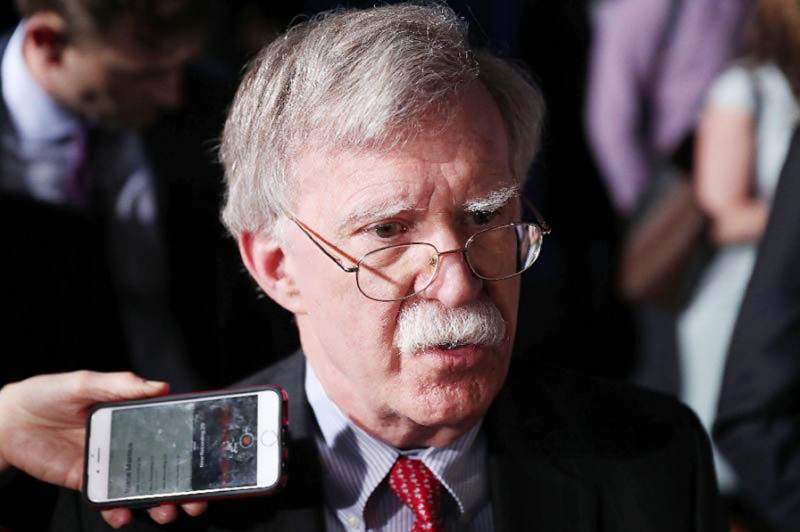
Reuters, Washington :
White House national security adviser John Bolton said on Monday Pakistan’s foreign minister has assured him Islamabad is committed to de-escalating tensions with India and dealing “firmly” with terrorists.
Bolton’s comments follow a Feb. 14 suicide bombing, claimed by Pakistan-based militants, which killed at least 40 Indian paramilitary police.
“Spoke with Pakistani FM (Shah Mehmood) Qureshi to encourage meaningful steps against JeM (Jaish-e-Mohammed) and other terrorist groups operating from Pakistan,” Bolton said on Twitter.
“The FM assured me that Pakistan would deal firmly with all terrorists and will continue steps to deescalate tensions with India,” Bolton added.
Pakistan, which denies Indian accusations of aiding militant groups, last week announced a crackdown against all proscribed outfits.
Pakistan’s foreign ministry late on Monday said Qureshi informed Bolton “about the de-escalatory measures taken by Pakistan” in the wake of the aerial bombing missions carried out by both countries in late February.
Qureshi told Bolton that Pakistan’s strike in Kashmir on Feb. 27 was in self-defense and retaliation to India’s raid on its territory a day earlier. New Delhi said it hit a JeM training camp in Pakistan, but Islamabad denies any such camp exists.
The two countries fought an aerial dogfight over Kashmir on Feb. 27, and a couple of days later Pakistan returned a downed Indian pilot in a gesture that appeared to de-escalate the crisis.
German Foreign Minister Heiko Maas, in a joint conference with Qureshi, commended Pakistan on Tuesday for returning the pilot and offering talks with India. But he also urged Islamabad to stamp out militant groups which attack neighboring countries.
“We both agreed that cross-border terrorism has to be permanently stopped and there too there have been positive signs in the past few days that we welcome very much,” Maas said. “Ultimately it’s about fighting any kind of terrorism and extremism.”
A simmering conflict between India and Pakistan over the Kashmir region, which both countries claim as theirs, has escalated in recent weeks.
A car bombing by JeM, a militant group based in Pakistan, killed at least 40 Indian paramilitary police in Kashmir last month.
In response, India launched airstrikes targeting the group.
The next day, Pakistan and India both said they had shot down each other’s warplanes, and Pakistan claimed to have captured an Indian pilot.
That pilot has since been returned after international backlash to his captivity.
World powers, including the U.S., China and Britain, have urged the two countries to ease tensions after those initial skirmishes.
Pakistan promises to crack down on militant groups attacking Indian rule over Kashmir, President Donald Trump’s national security advisor John Bolton said Monday.
Bolton tweeted that he had spoken with Pakistan’s Foreign Minister Shah Mehmood Qureshi and “the FM assured me that Pakistan would deal firmly with all terrorists and will continue steps to deescalate tensions with India.”
India has long accused Pakistan of covertly backing attacks by guerrillas in Kashmir.
In February, JeM, or the Jaish-e-Mohammed group, claimed responsibility for a suicide bombing that killed 40 Indian paramilitary members, triggering cross-border air raids and a surge in political tension between the nuclear-armed neighbors.
Bolton said that during his talks with Qureshi he’d set out “to encourage meaningful steps against JeM and other terrorist groups operating from Pakistan.”
The latest Pakistani reassurances came as US Secretary of State Mike Pompeo met in Washington with the Indian foreign secretary, Vijay Gokhale, and urged Pakistan to take “meaningful action against terrorist groups operating on its soil,” Pompeo’s spokesman said.
Pompeo’s spokesman said that during the secretary of state’s talks with Gokhale they “discussed the importance of bringing those responsible for the (February) attack to justice.”

